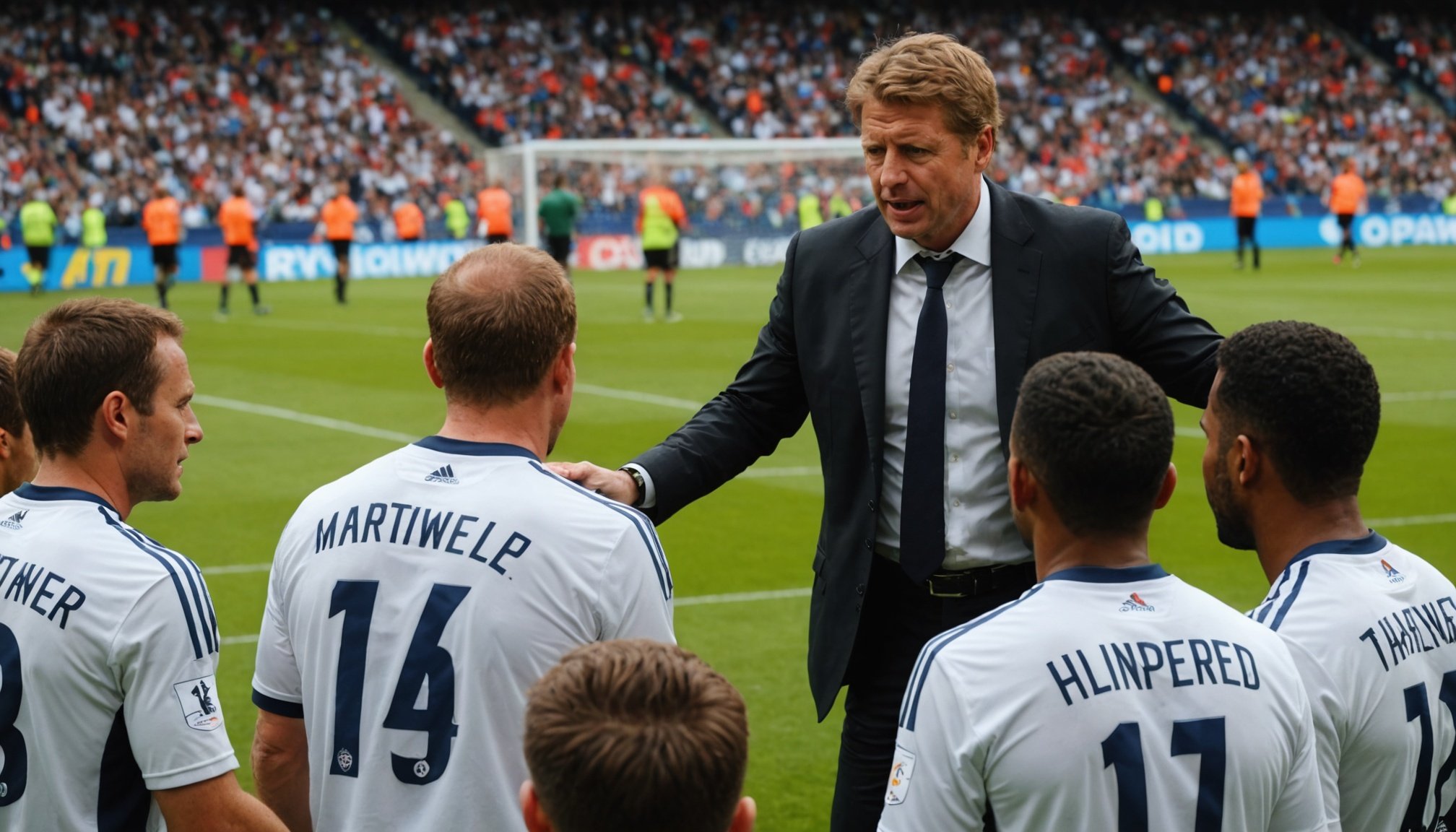Importance of Team Morale in Football
Team morale plays a crucial role in the dynamics and performance of any football squad. High team morale often correlates directly with performance enhancement on the field.
When players are motivated and confident, they tend to perform better, displaying enhanced skills and teamwork. Teams with high morale are usually seen communicating effectively and supporting each other, which can lead to stunning victories. The importance of motivation cannot be overstated when it comes to boosting the overall energy and output of the team.
Have you seen this : Unlocking On-Field Synergy: Innovative Off-Field Team Bonding Activities for Football Success!
On the flip side, low morale can significantly hinder a team’s success. There are numerous examples of football teams performing poorly, often facing consecutive losses due to a slump in morale. This decline can result from multiple factors, such as poor management, lack of motivation, or internal conflicts. Such issues disrupt team cohesion, causing players to underperform.
The impact of morale goes beyond the collective, affecting individual players too. A demotivated player is likely to make mistakes, miss crucial shots, and struggle with maintaining focus. Consequently, poor morale can spiral into a cycle of underachievement, affecting the team’s position in tournaments or leagues. Therefore, nurturing team morale is crucial not just for winning games but also for building a cohesive, thriving football squad.
Topic to read : Navigating Ethical Challenges: How Football Coaches Balance the Drive to Win with the Principles of Fair Play
Communication Strategies for Boosting Morale
Effective communication is vital for player engagement and maintaining team morale. Coaches can connect with players by employing transparent and consistent communication techniques. Open dialogue fosters trust, allowing players to express concerns and feel valued. Utilizing clear, respectful language ensures players understand objectives and expectations, empowering them to perform more effectively.
Incorporating regular feedback mechanisms can significantly enhance team dynamics. Constructive feedback—both positive and critical—serves as a foundation for improvement and growth. It is essential to frame feedback in a way that appreciates a player’s efforts while providing actionable insights for development. This approach not only motivates players but also reinforces a culture of continuous improvement.
Role models in sports management often attribute their success to effective communication strategies. For instance, a renowned football manager, known for his player-first approach, emphasised the importance of listening. He would dedicate time to individual player meetings, allowing personal and team-related issues to surface. By prioritising active listening, he built a team that was cohesive and resilient.
In summary, honing communication strategies and feedback channels can create a supportive environment, thus boosting overall team morale and performance. Implementing these techniques with consistency reinforces mutual respect and drives collective success.
Team-Building Exercises to Strengthen Bonds
Team-building is a vital component in fostering a cohesive team dynamic, especially in a sports environment. Off the field, there are numerous types of team-building activities that can significantly enhance group cohesion. For instance, trust exercises, like the classic trust fall, encourage players to rely on and support one another. Such activities build fundamental trust which is the bedrock of a successful team.
Undoubtedly, trust-building exercises have profound benefits. By engaging in these activities, team members learn to communicate effectively and bolster their trust in one another. This mutual confidence translates into a stronger, more supportive team network where individuals feel valued and understood.
Furthermore, these exercises are not just about improving relationships; they can enhance on-field performance. When team members trust each other, they can anticipate each other’s moves and work seamlessly as a unit during games. This synchronization often leads to better strategies and improved performance, as players function with a unified mindset.
Team-building exercises are more than just fun; they are powerful tools for creating an environment where every member is committed to a common goal, thereby making the team not just a group but a family.
Psychological Approaches to Uplift Team Spirit
Cultivating a positive mindset can drastically boost team morale and performance. A team that operates with an optimistic attitude is more resilient and can overcome challenges effectively. This mindset acts as a catalyst, fostering better communication, enhanced collaboration, and higher energy levels during competitions.
Motivation Techniques
Managers can implement various motivation techniques to invigorate their teams. One effective approach is setting clear, achievable goals, which provides players with a roadmap and a sense of purpose. Regular, positive feedback is another powerful tool, as it reinforces desirable habits and motivates players to maintain their efforts. Visualisation, where players mentally rehearse success, is also impactful, creating a sense of preparedness and boosting confidence.
Positive Mindset
Psychological strategies such as cultivating a positive mindset involve encouraging players to focus on their strengths and past successes. Techniques like mindfulness meditation can help athletes maintain composure and focus under pressure, enhancing their overall performance. Encouraging self-reflection enables team members to recognise their contributions and areas for growth, promoting continuous improvement.
Case Studies
Successful psychological interventions in sports reveal impressive outcomes. For instance, a football team struggling with low morale saw a significant turnaround by incorporating regular team-building exercises, positivity workshops, and individual coaching. This change resulted in an improved win rate, showcasing the undeniable power of psychological strategies.
Implementing Recognition and Rewards Systems
Understanding how to boost motivation in sports teams is crucial for achieving success. One effective method is through a well-structured recognition and rewards system. Recognizing players can be as simple as giving verbal praise or a public acknowledgment during meetings or events. Rewards might range from tangible items like trophies and gift cards to intangible benefits such as extra practice opportunities or leadership roles within the team.
An effective recognition system reinforces team values and informs players how their efforts contribute to the team’s overall goals. This fosters an environment of uplifting support where players are motivated to excel. The motivation boost from knowing their efforts will be rewarded encourages ongoing commitment and dedication to the team’s success.
Several clubs have implemented innovative rewards systems with outstanding results. For instance, some football clubs offer ‘Player of the Month’ accolades, complete with personalized jerseys and social media highlights, amplifying player motivation and team spirit. Exemplary managers often tailor their recognition methods to each player’s personality and preferences, thereby maximizing the impact of the rewards system.
In incorporating these systems, clubs should aim to establish clear criteria for rewards and maintain consistency to ensure fairness, thus bolstering team unity and collaborative efforts.
Fostering a Positive Environment
Cultivating a positive environment within a workplace is crucial for enhancing productivity and morale. A supportive culture thrives on mutual respect, collaboration, and open communication. When managers prioritize these values, it fosters a team spirit that drives success.
To create such an environment, managers should engage in strategies to cultivate positivity. Encouraging regular feedback, recognizing individual and team achievements, and maintaining transparency can significantly uplift workplace atmosphere. Regular team-building activities also promote camaraderie and understanding among colleagues, reinforcing a supportive culture.
Inclusivity and diversity play pivotal roles in fostering this environment. A diverse team brings a range of perspectives, enhancing creativity and problem-solving capabilities. Promoting inclusivity ensures that all members feel valued and appreciated, leading to increased job satisfaction and loyalty.
Incorporating these elements allows the cultivation of a robust and positive team spirit, even during challenging times. Managers should acknowledge each team member’s contributions and accommodate diverse viewpoints. This encourages continuous personal and professional growth, ensuring a dynamic and innovative workplace.
Overall, a supportive culture doesn’t happen overnight but requires ongoing commitment and effort. The payoff, however, is significant—resulting in high employee engagement, better team dynamics, and a thriving business environment that benefits everyone involved.
Real-Life Examples of Successful Morale Boosting
Exploring case studies of notable football figures provides valuable insights into effective morale techniques. One exemplary case is when Sir Alex Ferguson revitalized the Manchester United team during the early 1990s. Facing a low morale, Ferguson implemented a series of strategic interventions that included fostering a strong team culture, instilling discipline, and promoting young talents such as Ryan Giggs and Paul Scholes. These steps not only boosted the team’s spirit but also laid the foundation for their subsequent dominance in English football.
Another notable successful manager is Jürgen Klopp, who transformed Liverpool FC. Upon his arrival, the team was struggling both emotionally and professionally. Klopp’s approach was to build a sense of solidarity and motivation by focusing on positive reinforcement and constant engagement with the players. His emphasis on unity and the collective mission culminated in Liverpool winning the 2019 UEFA Champions League, proving the significant impact of effective morale management.
These examples underline how morale techniques, when correctly applied, can radically turn around not just the mood but the performance and achievements of sports teams. Managers who emphasize team ethos, clear communication, and personal and professional growth can transform low morale into a winning spirit. This not only enhances performance but also solidifies team identity and cohesion.
Continuous Development and Training for Managers
Employing continuous education for managers, focusing on morale-boosting techniques, is vital in fostering a motivated and engaged team. Regularly updating these skills through various manager training programs can significantly enhance team performance and satisfaction.
Leadership courses and workshops offer in-depth insights into team dynamics and motivation strategies. These programs allow managers to understand how to foster an environment where team members feel valued and driven. Courses often cover communication skills, conflict resolution, and ways to encourage creative thinking within a team. By developing these skills, managers can effectively lead and inspire their teams.
In addition, various resources are available for managers to refine their effective morale-boosting strategies. Online courses, seminars, and industry publications provide opportunities for self-paced learning. Managers can benefit by actively participating in peer groups or mentoring programs where they can share experiences and learn best practices from others.
Investing in continuous development ensures that managers do not only maintain their current skillset but also adapt to ever-evolving industry demands. This proactive approach helps managers support their teams better, leading to improved morale and sustained productivity.






